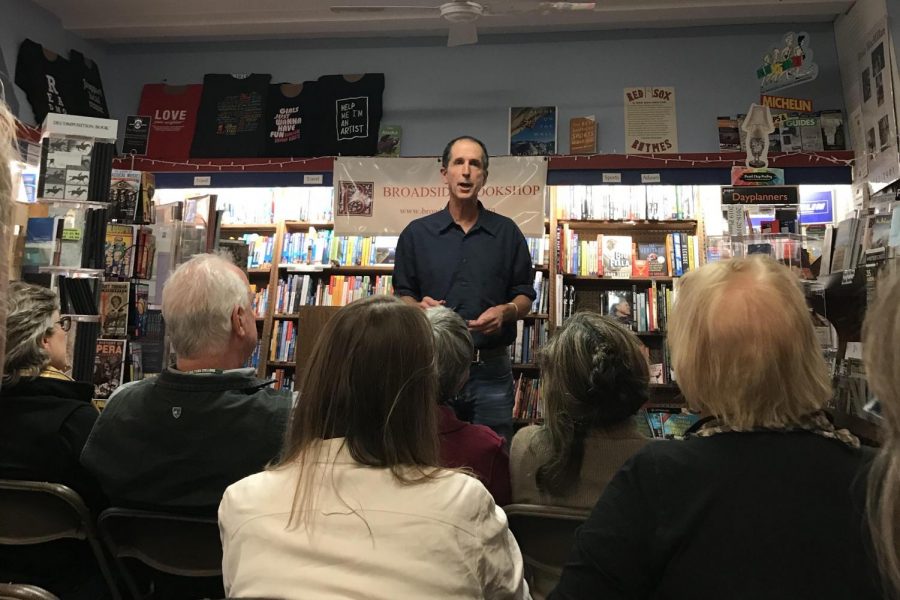On Nov. 24, 1968, the Harvard Crimson published the headline, “HARVARD BEATS YALE, 29-29.”
Almost 50 years later, on Wednesday evening at Broadside Bookshop in Northampton, George Colt, the author of the recently published book, “The Game: Harvard, Yale, and America in 1968,” spoke about the significance, relevance and his lived experience of that momentous football game.
For Colt and his family, Harvard football games were a religion of which they were loyal parishioners.
“Everything about Harvard football seemed outsized and heroic,” Colt read.
Colt described his childhood as “Harvard-saturated.” Colt’s father was a Harvard alumnus and worked in the college’s fundraising office. Colt later went on to attend and graduate from Harvard.
Nothing was more important to Colt and his family than the annual Harvard-Yale football game. When President John F. Kennedy was assassinated the day before the 1963 Harvard-Yale football game, which Kennedy planned to attend, Harvard planned to postpone the game a week.
Colt’s father’s response was “They can’t do that. It’s the Harvard-Yale game.”
On Nov. 23, 1968, Harvard and Yale both came into the game undefeated. Yale lead Harvard most of the game.
Colt read from his book and described the desire to go home as he anticipated the likely-loss for Harvard.
“And then, play by unlikely play, second by unbelievable second, the impossible took shape before our eyes,” Colt read
In the last 42 seconds of the game, Harvard scored 16 points to tie. Many historians have described Harvard’s win as a feat of near-mathematical improbability.
“Why write a book about a football game between two hotey-totey New England schools that took place fifty years ago?” Colt asked the crowd, rhetorically.
Neal Abraham, of Whately, spoke about the majority of readers who are not familiar with the 1968 game and have no memories. Abraham asked Colt, “What’re your experiences already talking with those (readers)?”
Colt said he had spoken with students at Yale who read his book prior to publication and they described being inspired by the activism of college students and young people in 1968
Colt also described the football game, which many historians have concurred, as one of the most exciting college football games in American history. The timing of the football game was also significant.
In 1968, both inside and outside of the walls of two of the country’s most prestigious institutions, times were changing and minds were shifting.
There were the civil rights and Black power movements, the women’s liberation movement, the assassinations of Martin Luther King Jr. and Robert F. Kennedy, and when the public learned that the United States was not winning the Vietnam war were just some of the events in history during the time surrounding the game.
“It was one of the most divisive years in American history,” Colt said.
In those times of change, Colt described, the miracle that happened in the Harvard-Yale football game was like a “flower blossoming in an urban sidewalk.
Nearly 50 years later, Colt discussed, many of the social issues faced in 1968 are still present and have taken new form today, like the Black Lives Matter and #MeToo movements.
“He speaks to the present as cogently as he presents the past,” said Madeleine Blais, writer and professor of journalism at the University of Massachusetts, during her introduction of Colt.
Colt read from the epilogue of his book during his presentation, which described the moments before Harvard’s triumphant victory.
“It seemed almost dark enough for stars to appear.”
Elizabeth Donohue can be reached at [email protected]



















